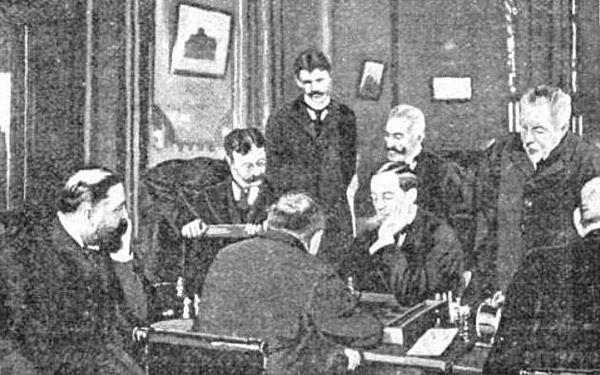
A Century of Chess: Monte Carlo 1902
There has probably never been a chess master whose ascent was as steady and orderly as Géza Maróczy's. He won the amateur tournament at Hastings 1895 in his international début, finished second at Nuremberg 1896 and London 1899 and third at Paris 1900. By late 1900, he seemed to be ready for the next step and took shared first at Munich but lost badly in a playoff. He won for the first time at Monte Carlo 1902, a very strong 20-player tournament, the largest of the series organized by Prince Dadian of Mingrelia, and then really was the world's leading tournament player over the next five or six years, fully earning the right to challenge Lasker for a match - at which point, he suddenly started to withdraw from competitive chess, not carrying through on the Lasker match (which dissipated for reasons that have never been clear) and then drifting away from tournaments altogether. When he returned to international chess in the 1920s, he was a strong, solid grandmaster but no longer playing at his earlier level.

Maróczy is a hard player to love. Even the outlines of his personality are difficult to detect - although it's very sweet that he was Viktor Korchnoi's choice (well, second choice) to play against in the séance game. "As a rule, his games are not brilliant attacking games," wrote Réti. His specialties were tenacious defense, theoretical knowledge particularly in the Sicilian, and the queen endgame, which occurred with uncanny frequency in his games. Really, he was the scientific, modern style pushed to a level of seriousness that no one had attempted before. His "talent bordering upon genius" was, as Lasker said, "the ability to take infinite pains.” In other words, he was a grind - and his best wins at Monte Carlo involve nursing small advantages deep into the endgame. The game against Teichmann below is a nice demonstration of his matured style.

A great strength of Maróczy's was competitive tenacity, which surfaced at Monte Carlo - he finished the tournament with 3.5 out of 4, edging out Pillsbury by the narrowest of all possible margins - one quarter of a point, as in the unique scoring system employed at Monte Carlo.
For the fourth time in five tournaments, Pillsbury finished second. He overcame early losses to Maróczy and the outsider Eisenberg, led most of the way, playing in his usual elegant style, and then lost energy at the finish line with consecutive losses to Chigorin and Marco. Playing over his losses, they seem closely allied to his wins - he favored loose, dynamic formations, and the margin between victory and defeat seemed always to hinge on very light, delicate combinations, and every so often an opponent would simply get in a tactic ahead of him.

As a setting, Monte Carlo was double-edged for David Janowski. The location seemed to invigorate his play - he had won the year before and took third this time with a heroic finish of five out of six - but on the other hand he gambled away his future winnings so prodigiously over the course of the tournament that his third place prize was reduced to a train ticket home to Paris - and he got into some fight with the tournament's organizer and was disinvited from play the next year.
Janowski's finish was at the expense of Richard Teichmann who had been with the leaders the whole time - and there was "universal regret," wrote The Brooklyn Daily Eagle, when Teichmann finished out of the winners' circle. He would settle into Richard the Fifth mode after this, and Monte Carlo would actually be Teichmann’s last serious bid for a top prize before Carlsbad a decade later. “Teichmann has for once done himself justice” was Checkmate Magazine’s acerbic comment, a gesture towards his habit of underachievement.
The tournament was Siegbert Tarrasch’s return to play after a four-year absence and he was somewhat out-of-form (as in the game with Janowski above) although the tournament was the occasion for him to deliver one of his best lines: 21-year-old William Napier, making his international début, was feeling sorry for himself after a loss to a weaker player and Tarrasch told him, “It is not enough to be a connoisseur of chess; one must also play well.” He also played this nice miniature.
Aging and in bad health, James Mason had an undistinguished tournament, withdrawing before the end and forfeiting his last games, but just before withdrawing he had a sudden flash of remorse and declared, “I can’t leave before beating Mr. Janowski."

Janowski was summoned, swore to defeat Mason - instead of accepting a forfeit like the rest of Mason’s opponents. Mason then played a gorgeous game, involving a queen sacrifice, which won the brilliancy prize and is the most reprinted game of the tournament, and which sent Janowski into a rage against Mason that lasted for years. “I don’t understand it,” he said in Ossip Bernstein’s reminiscence. “I am bewitched when I play Mason. All the time he smokes his bad cigars and spits I cannot stand it.”
The tournament produced one of the most famous cases of double blindness in chess - Georg Marco resigning in a won position against Von Popiel. So you don’t think that Marco was a pushover, I’m also including a gorgeous game he played against Frank Marshall who started strong but then reverted to the funk that would last until Cambridge Springs 1904.
(Thanks to batgirl for a terrific series on Monte Carlo and to Europe Échecs.}